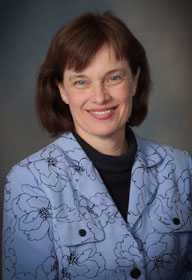In 1987, Congress designated the month of March that year as "Women's History Month." The annual observance continues to this day. United Methodist News Service invited several women, both lay and clergy, in The United Methodist Church to share their stories. Here is the response from Bishop Debra Wallace-Padgett, elected to the episcopacy in 2012. She serves the North Alabama Episcopal Area.
3:00 P.M. ET March 14, 2013 | BIRMINGHAM, Ala.
Q: Tell us a little about yourself.
A: I was born in a small community in eastern Kentucky called Buchanan. It is a rural area nestled in the foothills of Appalachia. Family, church, neighbors and a small school were at the center of the community.
I have wonderful childhood memories of immediate and extended family gatherings. We would gather around the dinner table, at church, at the ball field and in numerous other places. The point was not what we did or where we were but that we were together, enjoying each other's company, stories, laughter and encouragement.
I also remember playing sandlot basketball, football and baseball with cousins, siblings and neighbors. We would play the sport of the season for hours after school, on the weekends and during the summer.
I recall with fondness the two-room school where I received the first years of my education. Though it educated children through junior high, when I entered the third grade, my parents sent my siblings and me to a larger elementary school in a town called Louisa, which was about 20 minutes away. The primary reason ... was to ensure that we had opportunities to experience extracurricular activities. They spent many hours on the road between Buchanan and Louisa during my elementary, junior high and high school years transporting us to piano lessons, ballgames, dance lessons and band.
From there, I went to Berea (Ky.) College, where I received a Bachelor of Arts degree in physical education; Scarritt College and Graduate School, Nashville, Tenn. (Master of Arts, Christian education); Lexington Theological Seminary (M. Div.); and Asbury Theological Seminary, Wilmore, Ky. (D. Min.).
I am married to the Rev. Lee Padgett, a United Methodist deacon, who is in his last month of a 24-year position as executive director of Aldersgate Camp and Retreat Center, Ravenna, Ky. We have two children, Leanndra, 21, and Andrew, 18.
Q: In what local church did you grow up?
A: I grew up in the Prichard Memorial United Methodist Church, which became the Bear Creek United Methodist Church upon being relocated to the geographical center of Buchanan. My father was the pastor, and my mother was very active in this small-membership church where my faith was initially formed. My positive experience in that congregation has caused me to appreciate the life-shaping influence that healthy, small-membership churches can have on the lives of their members.
Q: What are your gifts and how do you share them with the church?
A: I believe that God's Holy Spirit gives each Christ-follower what we need to fulfill our calling. In my current role as bishop in North Alabama, primary gifts that I am utilizing are leadership, faith and encouragement.
Q: How do you nurture others, especially girls and women, through the church and in other aspects of your life?
A: Sometimes my vantage point allows me to see gifts in a person that they may not see in themselves. Other times, they recognize their giftedness but lose sight of it in the midst of life's challenges. As opportunities arise, I try to extend nurture to such persons via notes or conversations about the gifts that I see in them.
I also encourage others to expose themselves to the larger world. Education, travel, conferences and books are some of the ways that life-changing doors are opened for persons. When feasible, I also suggest or offer them opportunities to use their gifts to make a difference.
Q: Why is Women's History Month important to you?
A: Positive examples of women who have made a difference in the world have inspired me over the years. By lifting up such examples, Women's History Month helps all of us to enlarge our vision of who, by the grace of God, we can be.
This interview was conducted by Barbara Dunlap-Berg, internal content editor for United Methodist Communications, Nashville, Tenn. Contact Dunlap-Berg at (615) 742-5470 or [email protected].
Like what you're reading? Support the ministry of UM News! Your support ensures the latest denominational news, dynamic stories and informative articles will continue to connect our global community. Make a tax-deductible donation at ResourceUMC.org/GiveUMCom.





